| Counties of Wisconsin | |
|---|---|
 | |
| Location | State of Wisconsin |
| Number | 72 |
| Populations | 4,226 (Menominee) – 916,205 (Milwaukee) |
| Areas | 231.98 square miles (600.8 km) (Pepin) – 1,544.91 square miles (4,001.3 km) (Marathon) |
| Government | |
| Subdivisions |
|
There are 72 counties in the U.S. state of Wisconsin. The land that eventually became Wisconsin was transferred from British to American control with the 1783 signing of the Treaty of Paris. It was an unorganized part of the Northwest Territory until 1802 when all of the land from St. Louis north to the Canadian border was organized as St. Clair County. When Illinois was admitted to the union in 1818, Wisconsin became part of the Territory of Michigan and divided into two counties: Brown County in the northeast along Lake Michigan and Crawford County in the southwest along the Mississippi River. Iowa County was formed in 1829 from the Crawford County land south of the Wisconsin River. Brown County's southern portion was used to form Milwaukee County in 1834. The state of Wisconsin was created from Wisconsin Territory on May 29, 1848, with 28 counties.
The most populous county in the state is Milwaukee County at 916,205 people at the 2023 Census estimate. The county with the least population is Menominee County with 4,226 residents; the Menominee Indian Reservation is co-extensive with the county. Pepin County is the smallest in area, with 231.98 square miles (600.8 km); Marathon is the largest, having 1,544.91 square miles (4,001.3 km).
The Federal Information Processing Standard (FIPS) code, which is used by the United States government to uniquely identify states and counties, is provided with each entry. Wisconsin's code is 55, which when combined with any county code would be written as 55XXX. The FIPS code for each county links to census data for that county.
Governance
Each county has a county seat, often a populous or centrally located community, where the county's governmental offices are located. Some of the services provided by the county include: law enforcement, circuit courts, social services, vital records and deed registration, road maintenance, and snow removal. County officials include sheriffs, district attorneys, clerks, treasurers, coroners, surveyors, registers of deeds, and clerks of circuit court; these officers are elected for four-year terms. In most counties, elected coroners have been replaced by appointed medical examiners. State law permits counties to appoint a registered land surveyor in place of electing a surveyor.
Counties in Wisconsin are governed by county boards, headed by a chairperson. Counties with a population of 500,000 or more must also have a county executive. Smaller counties may have either a county executive or a county administrator. As of 2011, 13 counties had elected county executives: Brown, Chippewa, Dane, Fond du Lac, Kenosha, Manitowoc, Milwaukee, Outagamie, Portage, Racine, Sawyer, Waukesha, and Winnebago. 23 had an appointed county administrator, 34 had an appointed administrative coordinator, and 2 had neither an executive nor an administrator. Waukesha County had both an executive and an administrator.
List of counties
| County |
FIPS code | County seat | Est. | Formed from | Etymology | Population | Area | Map |
|---|---|---|---|---|---|---|---|---|
| Adams County | 001 | Friendship | 1848 | Portage County | John Quincy Adams (1767–1848), President of the United States (1825–29) | 21,449 | 645.65 sq mi (1,672 km) |

|
| Ashland County | 003 | Ashland | 1860 | La Pointe County | Ashland, Henry Clay's estate in Kentucky | 16,079 | 1,045.04 sq mi (2,707 km) |

|
| Barron County | 005 | Barron | 1859 | Polk County | Henry D. Barron, state senator and circuit court judge. | 46,833 | 862.71 sq mi (2,234 km) |

|
| Bayfield County | 007 | Washburn | 1845 | St. Croix County | Henry Bayfield, Royal naval officer and first to survey Great Lakes area | 16,769 | 1,477.86 sq mi (3,828 km) |

|
| Brown County | 009 | Green Bay | 1818 | unorganized territory | Major General Jacob Brown (1775–1828), commanding general of the United States Army during the War of 1812 | 271,417 | 529.71 sq mi (1,372 km) |

|
| Buffalo County | 011 | Alma | 1853 | Jackson County | The Buffalo River, which flows through the county. | 13,419 | 671.64 sq mi (1,740 km) |

|
| Burnett County | 013 | Siren | 1856 | Polk County | Thomas P. Burnett, state legislator | 17,092 | 821.85 sq mi (2,129 km) |

|
| Calumet County | 015 | Chilton | 1836 | Brown County, Wisconsin | The French word for a Menominee Ceremonial pipe. | 53,199 | 318.24 sq mi (824 km) |

|
| Chippewa County | 017 | Chippewa Falls | 1845 | Crawford County | Chippewa Indians | 66,970 | 1,008.37 sq mi (2,612 km) |
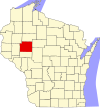
|
| Clark County | 019 | Neillsville | 1853 | Crawford County | George Rogers Clark (1752–1812), Revolutionary War general | 34,774 | 1,209.82 sq mi (3,133 km) |

|
| Columbia County | 021 | Portage | 1846 | Portage County | Christopher Columbus (1451–1506), navigator and explorer | 58,091 | 765.53 sq mi (1,983 km) |

|
| Crawford County | 023 | Prairie du Chien | 1818 | unorganized territory | William Harris Crawford (1772–1834), United States Senator from Georgia (1807–13) and Secretary of the Treasury (1816–25) | 15,944 | 570.66 sq mi (1,478 km) |
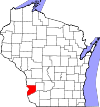
|
| Dane County | 025 | Madison | 1836 | Crawford, Iowa, and Milwaukee Counties | Nathan Dane (1752–1835), delegate to the First Continental Congress (1785–88) | 575,347 | 1,197.24 sq mi (3,101 km) |

|
| Dodge County | 027 | Juneau | 1836 | Brown and Milwaukee Counties | Henry Dodge (1782–1867), Territorial Governor of Wisconsin (1845–48) | 88,231 | 875.63 sq mi (2,268 km) |
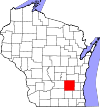
|
| Door County | 029 | Sturgeon Bay | 1851 | Brown County | A dangerous water passage near Door Peninsula known as Porte des Morts or "door of the dead" in French | 30,562 | 481.98 sq mi (1,248 km) |

|
| Douglas County | 031 | Superior | 1854 | La Pointe County | Stephen Douglas (1813–61), United States Senator from Illinois (1847–61) | 44,264 | 1,304.14 sq mi (3,378 km) |
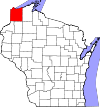
|
| Dunn County | 033 | Menomonie | 1854 | Chippewa County | Charles Dunn, state senator and chief justice of Wisconsin Territory | 45,794 | 850.11 sq mi (2,202 km) |

|
| Eau Claire County | 035 | Eau Claire | 1856 | Chippewa County | City of Eau Claire French for "clear water" | 107,903 | 637.98 sq mi (1,652 km) |

|
| Florence County | 037 | Florence | 1881 | Marinette and Oconto Counties | Florence Hulst (1851-1942), the first white woman to settle in the area | 4,682 | 488.20 sq mi (1,264 km) |
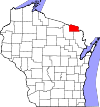
|
| Fond du Lac County | 039 | Fond du Lac | 1836 | Brown County | French for "bottom of the lake" | 103,948 | 719.55 sq mi (1,864 km) |
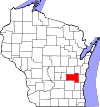
|
| Forest County | 041 | Crandon | 1885 | Langlade and Oconto Counties | Forest which covered the area when it was settled | 9,325 | 1,014.07 sq mi (2,626 km) |

|
| Grant County | 043 | Lancaster | 1837 | Iowa County | Probably a trader named Grant who made contact with area natives in 1810 but about whom little else is known | 51,409 | 1,146.85 sq mi (2,970 km) |

|
| Green County | 045 | Monroe | 1837 | Iowa County and unorganized territory | Nathanael Greene (1742–86), quartermaster general during the American Revolutionary War | 36,951 | 583.96 sq mi (1,512 km) |
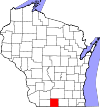
|
| Green Lake County | 047 | Green Lake | 1858 | Marquette County | Green Lake located within the county | 19,344 | 349.44 sq mi (905 km) |

|
| Iowa County | 049 | Dodgeville | 1829 | Crawford County | Iowa tribe of Indians | 23,956 | 762.58 sq mi (1,975 km) |

|
| Iron County | 051 | Hurley | 1893 | Ashland and Oneida Counties | Local iron deposits | 6,228 | 758.17 sq mi (1,964 km) |

|
| Jackson County | 053 | Black River Falls | 1853 | La Crosse County | Andrew Jackson (1767–1845), President of the United States (1829–37) | 20,855 | 987.72 sq mi (2,558 km) |

|
| Jefferson County | 055 | Jefferson | 1836 | Milwaukee County | Thomas Jefferson (1743–1826), President of the United States (1801–09) | 85,743 | 556.47 sq mi (1,441 km) |
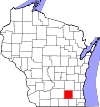
|
| Juneau County | 057 | Mauston | 1856 | Adams County | Solomon Juneau (1793–1856), founder of what would become Milwaukee | 26,594 | 766.93 sq mi (1,986 km) |

|
| Kenosha County | 059 | Kenosha | 1850 | Racine County | Indian word meaning "place of the pike" | 167,488 | 271.99 sq mi (704 km) |
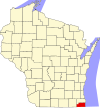
|
| Kewaunee County | 061 | Kewaunee | 1852 | Door County | Either a Potawatomi word meaning "river of the lost" or an Ojibwe word meaning "prairie hen" "wild duck" or "to go around" | 20,690 | 342.52 sq mi (887 km) |
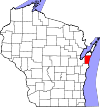
|
| La Crosse County | 063 | La Crosse | 1851 | Crawford County | Indian game of lacrosse | 120,486 | 451.69 sq mi (1,170 km) |
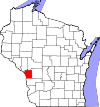
|
| Lafayette County | 065 | Darlington | 1846 | Iowa County | Gilbert du Motier marquis de La Fayette (1757–1834), a French general in the American Revolutionary War | 16,945 | 633.59 sq mi (1,641 km) |

|
| Langlade County | 067 | Antigo | 1879 | Oconto County | Charles de Langlade (1729 – c. 1800), American Revolutionary War veteran and United States Indian Agent in Green Bay | 19,404 | 870.64 sq mi (2,255 km) |

|
| Lincoln County | 069 | Merrill | 1874 | Marathon County | Abraham Lincoln (1809–65), President of the United States (1861–65) | 28,405 | 878.97 sq mi (2,277 km) |

|
| Manitowoc County | 071 | Manitowoc | 1836 | Brown County | Munedoo-owk, an Ojibwe word meaning "the place of the good spirit" | 81,331 | 589.08 sq mi (1,526 km) |
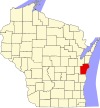
|
| Marathon County | 073 | Wausau | 1850 | Portage County | Marathon, Greece | 138,612 | 1,544.98 sq mi (4,001 km) |
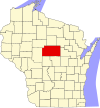
|
| Marinette County | 075 | Marinette | 1879 | Oconto County | Marie Antoinette Chevalier, Indian wife of an early fur trapper | 42,106 | 1,399.35 sq mi (3,624 km) |

|
| Marquette County | 077 | Montello | 1836 | Brown County | Jacques Marquette (1637–75), missionary and explorer | 15,838 | 455.60 sq mi (1,180 km) |

|
| Menominee County | 078 | Keshena | 1959 | Menominee Indian Reservation, Shawano, and Oconto Counties | Menominee Indians | 4,226 | 357.61 sq mi (926 km) |

|
| Milwaukee County | 079 | Milwaukee | 1834 | Brown County | Mahnawaukee-Seepe, an Indian word meaning "gathering place by the river" | 916,205 | 241.40 sq mi (625 km) |

|
| Monroe County | 081 | Sparta | 1854 | La Crosse County | James Monroe (1758–1831), President of the United States (1817–25) | 46,151 | 900.78 sq mi (2,333 km) |

|
| Oconto County | 083 | Oconto | 1851 | Brown County | An Indian settlement and the Oconto River, whose name means "plentiful with fish" | 39,775 | 997.99 sq mi (2,585 km) |

|
| Oneida County | 085 | Rhinelander | 1885 | Lincoln County | Oneida Indians | 38,226 | 1,112.97 sq mi (2,883 km) |
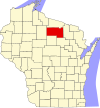
|
| Outagamie County | 087 | Appleton | 1851 | Brown County | Outagamie Indians | 193,234 | 637.52 sq mi (1,651 km) |

|
| Ozaukee County | 089 | Port Washington | 1853 | Washington County | The Ojibwe word for the Sauk nation | 93,460 | 233.08 sq mi (604 km) |
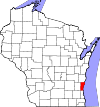
|
| Pepin County | 091 | Durand | 1858 | Dunn County | Pierre and Jean Pepin du Chardonnets, explorers | 7,441 | 231.98 sq mi (601 km) |

|
| Pierce County | 093 | Ellsworth | 1853 | Saint Croix County | Franklin Pierce (1804–69), President of the United States (1853–57) | 43,026 | 573.75 sq mi (1,486 km) |

|
| Polk County | 095 | Balsam Lake | 1853 | Saint Croix County | James Polk (1795–1849), President of the United States (1845–49) | 45,762 | 913.96 sq mi (2,367 km) |

|
| Portage County | 097 | Stevens Point | 1836 | Brown, Crawford, Iowa, and Milwaukee Counties | Passage between the Fox and Wisconsin Rivers | 71,024 | 800.68 sq mi (2,074 km) |
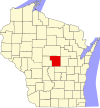
|
| Price County | 099 | Phillips | 1879 | Chippewa and Lincoln Counties | William T. Price (1824–86), Representative from Wisconsin (1883–86) | 14,102 | 1,254.38 sq mi (3,249 km) |
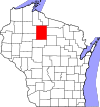
|
| Racine County | 101 | Racine | 1836 | Milwaukee County | Racine, the French word for "root", after the Root River, which flows through the county | 196,613 | 332.5 sq mi (861 km) |

|
| Richland County | 103 | Richland Center | 1842 | Iowa County | The rich soil of the area | 17,197 | 586.15 sq mi (1,518 km) |

|
| Rock County | 105 | Janesville | 1836 | Milwaukee County | Rock River, which flows through the county | 164,278 | 718.14 sq mi (1,860 km) |

|
| Rusk County | 107 | Ladysmith | 1901 | Chippewa County | Jeremiah McLain Rusk (1830–93), Governor of Wisconsin (1882–89) | 14,143 | 913.59 sq mi (2,366 km) |

|
| Sauk County | 111 | Baraboo | 1840 | Crawford, Dane and Portage Counties | Sauk Indians | 65,920 | 830.9 sq mi (2,152 km) |

|
| Sawyer County | 113 | Hayward | 1883 | Ashland and Chippewa Counties | Philetus Sawyer (1816–1900), Representative (1865–75) and Senator (1881–93) from Wisconsin | 18,552 | 1,257.31 sq mi (3,256 km) |

|
| Shawano County | 115 | Shawano | 1853 | Oconto County | An Ojibwe word meaning "southern" | 41,109 | 893.06 sq mi (2,313 km) |

|
| Sheboygan County | 117 | Sheboygan | 1836 | Brown County | Shawb-wa-way-kun, an Indian word meaning "great noise underground" | 117,752 | 511.27 sq mi (1,324 km) |

|
| St. Croix County | 109 | Hudson | 1840 | Crawford County, and unorganized territory | An early French explorer named St. Croix, about whom little is known | 96,763 | 722.33 sq mi (1,871 km) |

|
| Taylor County | 119 | Medford | 1875 | Clark, Lincoln, Marathon and Chippewa Counties | William Robert Taylor (1820–1909), Governor of Wisconsin 1874–76 | 20,058 | 974.88 sq mi (2,525 km) |

|
| Trempealeau County | 121 | Whitehall | 1854 | Buffalo, Chippewa, Jackson, and La Crosse Counties | Trempealeau Mountain (from the French for "mountain with its foot in the water"), a bluff located in a bend of the Trempealeau River, which flows through the county | 30,899 | 732.97 sq mi (1,898 km) |

|
| Vernon County | 123 | Viroqua | 1851 | Richland and Crawford Counties | Mount Vernon, home of George Washington | 31,170 | 791.58 sq mi (2,050 km) |

|
| Vilas County | 125 | Eagle River | 1893 | Oneida County | William Vilas (1840–1908), officer in the Civil War United States Postmaster General (1885–88) United States Secretary of the Interior (1888–89) and Senator from Wisconsin (1891–97) | 23,885 | 856.60 sq mi (2,219 km) |

|
| Walworth County | 127 | Elkhorn | 1836 | Milwaukee County | Reuben Hyde Walworth (1788–1867), jurist from New York | 105,822 | 555.13 sq mi (1,438 km) |

|
| Washburn County | 129 | Shell Lake | 1883 | Burnett County | Cadwallader Washburn (1818–82), Governor (1872–74) and Representative from Wisconsin (1867–71) | 16,930 | 797.11 sq mi (2,065 km) |

|
| Washington County | 131 | West Bend | 1836 | Brown and Milwaukee Counties | George Washington (1732–99), American Revolutionary War leader (1775–83) and first President of the United States (1789–97) | 138,168 | 430.70 sq mi (1,116 km) |

|
| Waukesha County | 133 | Waukesha | 1846 | Milwaukee County | Waugooshance, a Pottawatomi word meaning "little foxes" | 412,591 | 549.57 sq mi (1,423 km) |

|
| Waupaca County | 135 | Waupaca | 1851 | Brown and Winnebago Counties | wau-pa-ka-ho-nak, a Menominee word meaning "white sand bottom" or "brave young hero" | 51,388 | 747.71 sq mi (1,937 km) |

|
| Waushara County | 137 | Wautoma | 1851 | Marquette County | An Indian word meaning "good earth" | 24,934 | 626.15 sq mi (1,622 km) |
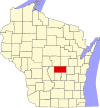
|
| Winnebago County | 139 | Oshkosh | 1840 | Brown, Calumet, and Fond du Lac Counties | Winnebago Indians | 171,735 | 434.49 sq mi (1,125 km) |

|
| Wood County | 141 | Wisconsin Rapids | 1856 | Portage County | Joseph Wood (1809–90), state legislator (1856–58) | 73,939 | 793.12 sq mi (2,054 km) |

|
Renamed counties
Five counties in Wisconsin have been renamed, but otherwise kept their same borders.
- Bad Axe County existed from 1851 to 1862. It was named after the Bad Axe River and the Battle of Bad Axe. It was renamed to Vernon County in 1862.
- Dallas County existed for 10 years, from 1859 to 1869. It was named after George M. Dallas, the 11th vice president of the United States. It was named to Barron County in 1869.
- Gates County existed from 1901 to 1905. It was named after Milwaukee land speculator James L. Gates. It was renamed to Rusk County in 1905.
- La Pointe County existed from 1845 to 1866. In 1848, when Wisconsin achieved statehood, La Pointe County was split between Wisconsin and Minnesota. It was renamed to Bayfield County in 1866.
- New County existed briefly between 1879 and 1880. It was formed from part of Oconto County. It was renamed to Langlade County in 1880.
Proposed counties
Two proposed counties were ultimately not established.
- In 1850, Tuskola County was proposed as a new subdivision of Washington County. The proposed borders lie within the modern Washington and Ozaukee counties.
- In 1997, Century County was proposed, for creation after the year 2000, as a merger of Wood, Clark, and Marathon counties that would be centered around the city of Marshfield. The name was selected to represent "a new county for a new century". Problems associated with Frac Sand mining rekindled the idea in 2012.
See also
- BOW counties
- WOW counties
- Political subdivisions of Wisconsin
- List of cities in Wisconsin
- List of villages in Wisconsin
- List of towns in Wisconsin
References
- ^ Curtiss-Wedge, Franklyn (1919). History of Buffalo and Pepin Counties, Wisconsin, Volume 1. Higginson Book Company. pp. 3–4. Archived from the original on September 22, 2023. Retrieved October 26, 2020.
- ^ "Wisconsin QuickFacts". U.S. Census Bureau. Archived from the original on November 19, 2021. Retrieved April 19, 2024. (2023 Census estimates)
- "FIPS Publish 6-4". National Institute of Standards and Technology. Archived from the original on September 29, 2013. Retrieved February 11, 2008.
- ^ "EPA County FIPS Code Listing". US Environmental Protection Agency. Archived from the original on October 7, 2013. Retrieved February 11, 2008.
- Wisconsin Legislative Reference Bureau. State of Wisconsin 2011–2012 Blue Book Archived December 28, 2017, at the Wayback Machine. Madison: Joint Committee on Legislative Organization, 2011, p. 736.
- Wisconsin Legislative Reference Bureau. State of Wisconsin 2011–2012 Blue Book Archived December 28, 2017, at the Wayback Machine. Madison: Joint Committee on Legislative Organization, 2011, p. 732.
- "NACo – Find a county". National Association of Counties. Archived from the original on May 31, 2011. Retrieved February 11, 2008.
- Wisconsin Legislative Reference Bureau. State of Wisconsin 2011–2012 Blue Book Archived December 28, 2017, at the Wayback Machine. Madison: Joint Committee on Legislative Organization, 2011, p. 731.
- ^ Carver, Jonathon (1910). Proceedings of the State Historical Society of Wisconsin at its Fifty-Seventh Annual Meeting (1st ed.). Madison WI: Democrat Printing Company. (WV County Founding Dates and Etymology). Other editions available at ISBN 1130567257 and Google Books Archived April 4, 2023, at the Wayback Machine
- Elkins, Winston (1985). Trempealeau and the Mississippi River Dam. Trempealeau County, WI: Trempealeau County Historical Society.
- "Interactive Map of Wisconsin County Formation History". mapgeeks.org. Archived from the original on March 28, 2018. Retrieved September 15, 2014.
- History of Vernon County, Wisconsin. Viroqua, WI: Union Publishing. 1884. p. 132. (Bad Ax County). Other editions available: ISBN 1178120341 and Google Books
- "Dictionary of Wisconsin History". Wisconsin Historical Society. Archived from the original on August 24, 2008. Retrieved February 27, 2013.
- Gannett, Henry (1905). The Origin of Certain Place Names in the United States. Govt. Print. Off. pp. 135.
- Rusk County Museum Archived October 22, 2013, at the Wayback Machine
- "Wisconsin Historical Society-La Pointe County, Wisconsin (obsolete)". Archived from the original on May 8, 2014. Retrieved March 4, 2013.
- 'History of Langlade County, Wisconsin from U.S. Government Survey to Present Time, With Biographical Sketches,' Robert Dessueran, Bernier Bros Publishing Co., Antigo, Wisconsin: 1922, History of Langlade County, Chapter V: Organization of Langlade County, pg. 12
- Wisconsin (1850). "Acts and Resolves Passed by the Legislature of Wisconsin". Archived from the original on September 22, 2023. Retrieved June 25, 2021.
- Clark, Anita (September 28, 1997). "New county only solution to poor service, some say". The Journal Times. Archived from the original on November 5, 2016. Retrieved January 9, 2017.
- Kirkby, Sean (March 4, 2012). "Professor advocates creating a new state county". Badger Herald. The Badger Herald. Archived from the original on June 28, 2020. Retrieved March 4, 2012.
Further reading
- writer, Statf (2022). "WISCONSIN COUNTY GOVERNMENT OVERVIEW" (PDF). ce.naco.org. National Association of Counties (NACo). Retrieved January 3, 2025.
External links
- Wisconsin historical county boundaries map from Atlas of Historical County Boundaries at Newberry Library website